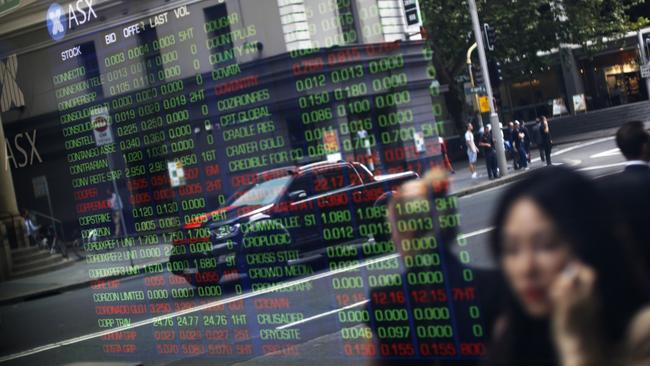Cost pressures starting to take toll on business: Morgan Stanley
Australian shares have had a great run since the pandemic and Morgan Stanley sees limited upside for the overall market in the year ahead.

Business
Don't miss out on the headlines from Business. Followed categories will be added to My News.
Australian shares have had a great run since the pandemic and Morgan Stanley sees limited upside potential for the market in the year ahead as inflation pressures build.
With a 12-month target of 7200 for the S&P/ASX 200 index, just 2.4 per cent above Friday’s close, the investment bank says investors should buy value and quality rather than growth stocks.
“The story remains one of rotational opportunity,” said Morgan Stanley Australia equity strategist Chris Nicol.
“This means retaining leverage to mid-cycle expansion while also embracing a degree of quality as a hedge to later-cycle risks that attach to building inflation and higher bond yields.”
After falling 39 per cent at the start of the pandemic, the ASX 200 hit a record daily close of 7172.8 early this month, having risen 63 per cent from its post-pandemic low of 4402.5.
Morgan Stanley’s target assumes the consensus estimate of earnings per share for the 2022-23 financial year will be revised up by 6 per cent and the 12-month forward price-to-earnings multiple will fall to 17 times as the 10-year bond yield rises to 2.3 per cent versus 1.73 per cent on Friday.
With an expected dividend yield of 4 per cent, the share index is expected to give a decent total return of 6.4 per cent over the next 12 months.
But Nicol warned that cost pressures from a faster than usual economic recovery and supply chain disruption will flow into corporate outlook statements in the next few reporting seasons and that the bulk of the post-COVID upgrade cycle will be completed by year’s end.
Kogan.com shares dived 14 per cent to a 12-month low of $8.70 on Friday after the online retailer said it was suffering from bloated inventory, cost pressures, logistics headaches at its warehouses and elevated advertising costs.
Its revised estimates for adjusted 2021 earnings were as much as 18 per cent below expectations.
Kogan.com was also hit by shipping fees and rising prices for key consumer goods.
After rising 642 per cent during the pandemic, Kogan shares have fallen 66 per cent.

The profit warning from Kogan came after Morgan Stanley warned of a “hotter, shorter” economic cycle, with strong capital expenditure expected to drive economic activity well above its pre-COVID path and US policymakers likely to be “slow to be respond” to rising inflation.
The US investment bank told clients to reduce their exposure to credit and equities this week.
Expectations of rising inflation were now “firmly entrenched in market debate”, Mr Nicol said, and a continued rise in bond yields should steer investors away from “growth scarcity trades” and “long duration positioning” that did so well in the early stages of the pandemic.
But he also said the “deep value opportunity has largely passed” and a “broader reflation exposure” in Australia via selected exposure to the materials and energy sectors now made sense, while banks and diversified financials also retained “value credentials”.
Domestic economic growth should remain solid amid supportive policy settings and a strong housing market, even though the RBA was expected to signal plans to lessen its bond buying later in the year, but slow vaccination rates and an extension of closed borders were among the risks to growth.
But most markets were expected to “start to grapple with transitioning from embracing the hope of reopening to the reality of such” amid building cost pressures, margin squeeze and missed sales, with issues centred around materials, component and labour shortages.
“In Australia, we are on watch for this to emerge as an issue for earnings,” Mr Nicol said.
Australia’s low vaccination rates and the prospect of its borders staying closed for longer could mean that some of the reopening pressures on the horizon will lag markets like the US.
But Nicol is expecting such warnings to be a feature of the August reporting period in terms of corporate earnings for fiscal 2021 and guidance for the first half of fiscal 2022.
Still, with the federal budget remaining stimulatory and maintaining tax incentives for capital expenditure, he said “animal spirits are now in play”, as evidenced by record-high business conditions and confidence as well as booming capex intentions in NAB’s monthly business survey.
And with a better-than-feared COVID impact and the focus now on recovery, companies were expected to shift from “preservation and caution” to “capital allocation and return”.
“Stocks that can deploy capital to drive improved earnings and will likely be rewarded,” Mr Nicol said.




